10 Herbs for Gut Health & Healing
Gut health is an important indicator of overall health. In this article, I share 10 herbs for supporting gut health and relieving gastrointestinal issues. Learn to support your gut health naturally with herbal support.

How Herbs Affect Gut Health
Ayurveda and other alternative medical systems have used herbs for many years to treat problems relating to gut health. You can find references to herbs being used for medical purposes in everything from The Vedas (Indian holy books) to the Bible.
The fibers in herbs are considered to be prebiotics – plant fibers that feed the good bacteria in the gut. This is a theory that has been borne out by science, with studies demonstrating that certain herbs can positively influence the microbiome, reducing inflammation and protecting against infection.
The idea of medicine-food homology (the concept that foods are medicines) is becoming much more widely accepted by practitioners of modern medicine, particularly when it comes to the balance of good and bad bacteria in the gut. See how to find a holistic doctor near you.
The authors of this study, for example, concluded that herbal-derived medicine could be used not just to treat human diseases, but also to prevent them by positively influencing the microbiome.
Herbs for Gut Health
1. Peppermint
Peppermint is among the most popular herbs used to improve gut health.
Studies have shown that it has antimicrobial and anti-inflammatory effects, making it useful in treating irritable bowel syndrome, abdominal pain, nausea, and recurring stomach upsets. Peppermint oil contains menthol and methyl salicylate, which are antispasmodic in nature.
This means that peppermint oil has a calming effect on the digestive system and relieves uncomfortable symptoms like bloating and gas. It does this by improving the flow of bile, which is used by the body to digest fats. Food then passes through the stomach far more quickly. It also helps to relax the muscle of the bowel wall, reducing uncomfortable cramping.
Peppermint can be consumed as a tea, made with the dried leaves of the plant. Peppermint oil in capsule form, however, tends to be more effective and is taken before meals. Capsules are usually coated so that they will pass through the stomach without breaking down and will go straight to the intestine instead. This is important, as the release of peppermint oil in the stomach can cause heartburn.
Speak to your doctor before taking peppermint oil as it is not suitable for everyone, particularly people suffering from GERD (gastroesophageal reflux disease).
2. Ginger
Another popular herb for maintaining gut health, ginger contains an active component called gingerol. Experts have found that gingerol is an antioxidant that can help protect against cancer. It also has anti-inflammatory properties that make it useful in reducing abdominal pain and discomfort.
Ginger is great for preventing nausea, motion sickness, and indigestion, too. This is because it helps you digest foods more efficiently so that they exit the stomach quickly and pass rapidly through the digestive tract.
This makes ginger a safe alternative to conventional drugs for treating nausea in pregnant women, or in patients undergoing chemotherapy.
There are also studies confirming that ginger has a positive effect on the gut’s microbiome and helps maintain the cells of the intestinal barrier. This is important as it prevents a condition known as intestinal permeability, where a damaged gut lining allows partially digested food, bacteria, and toxins into the bloodstream.
There are lots of different ways to enjoy ginger. It makes a deliciously warming tea, with ginger tea bags available in many grocery stores. These contain dried ginger, the effects of which are more potent than fresh ginger.
You can, of course, use freshly grated ginger in your recipes, or enjoy pickled ginger (the type served with sushi, which as a fermented food, is packed with probiotics).
Both ginger and mint are on my list of vegetable juice ingredients for gut health.
3. Chamomile

Chamomile is one of the most popular herbs used to make herbal teas, revered for centuries for its ability to relax the digestive system and relieve problems such as indigestion, gas, diarrhea, nausea, and vomiting.
These benefits are all backed by science, with chamomile proven to be packed with antioxidants and to have anti-inflammatory properties.
In fact, so effective is chamomile in calming the gut that it is one of the herbs used in a commercial preparation designed to protect against the development of gastric ulcers.
4. Fennel
If you’ve ever been given a little dish of seeds to chew at the end of an Indian meal, then chances are you’ve tried fennel seeds, which are believed to aid with digestion and prevent gas.
The fennel plant is considered to be good for your gut health, too, although not as potent as the seeds. That’s because the seeds contain a higher concentration of fennel oil.
Studies have shown that both the plant and the seeds contain anethole and are anti-bacterial and anti-inflammatory in nature. This means they can reduce intestinal irritation and destroy the bacteria that can cause gas.
They may also help the intestinal muscles to relax, preventing constipation. Additionally, fennel seeds are high in fiber, an important nutrient for a healthy digestive tract.
Aside from chewing fennel seeds after a meal, you can crush them and use them to make tea, or toast them and add them to dishes for an interesting licorice flavor. Fennel seeds are also available in capsule form.
If you prefer to eat the whole foods, the fennel bulb can be used raw in salads or is delicious when roasted and served as a side dish with your main meal. Look for raw fennel bulb in the produce aisle of your local grocery store.
5. Turmeric

Turmeric is one of the main ingredients in curry powder, with a lovely golden color and a fragrant, pleasantly bitter flavor.
What’s more, it’s great for your digestive health. That’s because it contains curcumin, an anti-inflammatory compound that can help keep the gut microbiome well-balanced and reduce intestinal inflammation. It’s also been found to improve intestinal barrier function, helping reduce the risk of leaky gut syndrome.
The only problem with curcumin is that its bioavailability is low, which means we don’t absorb much of it from the foods we eat.
For that reason, many people choose to take turmeric in supplement form. Turmeric capsules usually include an ingredient called piperine, which is an alkaloid found in black pepper. Piperine helps your body absorb curcumin more effectively.
You can try adding freshly ground black pepper to any meals you cook with turmeric in order to absorb as much curcumin from it as possible.
6. Glutamine
Glutamine isn’t actually an herb – instead, it’s an important amino acid that has many functions in the human body.
A building block of protein with an essential role in supporting the immune system, it has been shown to improve gut health by maintaining the microbiome, controlling inflammation, and preserving the integrity of the intestinal wall. By helping maintain that important barrier between your intestines and your bloodstream, it stops harmful bacteria or toxins from moving into the rest of your body.
Glutamine comes in two different forms – L-glutamine and D-glutamine. L-glutamine is the kind that exists in foods and supplements and it is used in the body to make proteins.
Although your body is capable of making some L-glutamine of its own, sometimes your need for it outweighs the amount your body is producing. For this reason, it’s described as a “conditionally essential amino acid“, which means that you must obtain it from the diet if you are in poor health.
High-protein foods like meat and fish are the best sources of glutamine. Other good sources include eggs, milk, and tofu. You can also buy L-glutamine supplements, which are usually available in powder or capsule form.
7. Marshmallow root
Interestingly, the Greek name for marshmallow – Althainean – means “to heal”!
And when it comes to the gut, that’s exactly what this herb does, mainly due to the substance called mucilage that it secretes from its roots and stems. This helps it line the coating of the digestive tract, soothing irritation, reducing inflammation, and helping prevent digestive disorders like heartburn and stomach ulcers.
There is evidence that it helps repair the lining of the gut, too, reducing the risk of leaky gut syndrome or peptic ulcers, and that it may be helpful in treating inflammatory bowel diseases like Crohn’s disease and ulcerative colitis.
You can use marshmallow root to make tea or buy it in capsule or tincture form.
8. Slippery elm
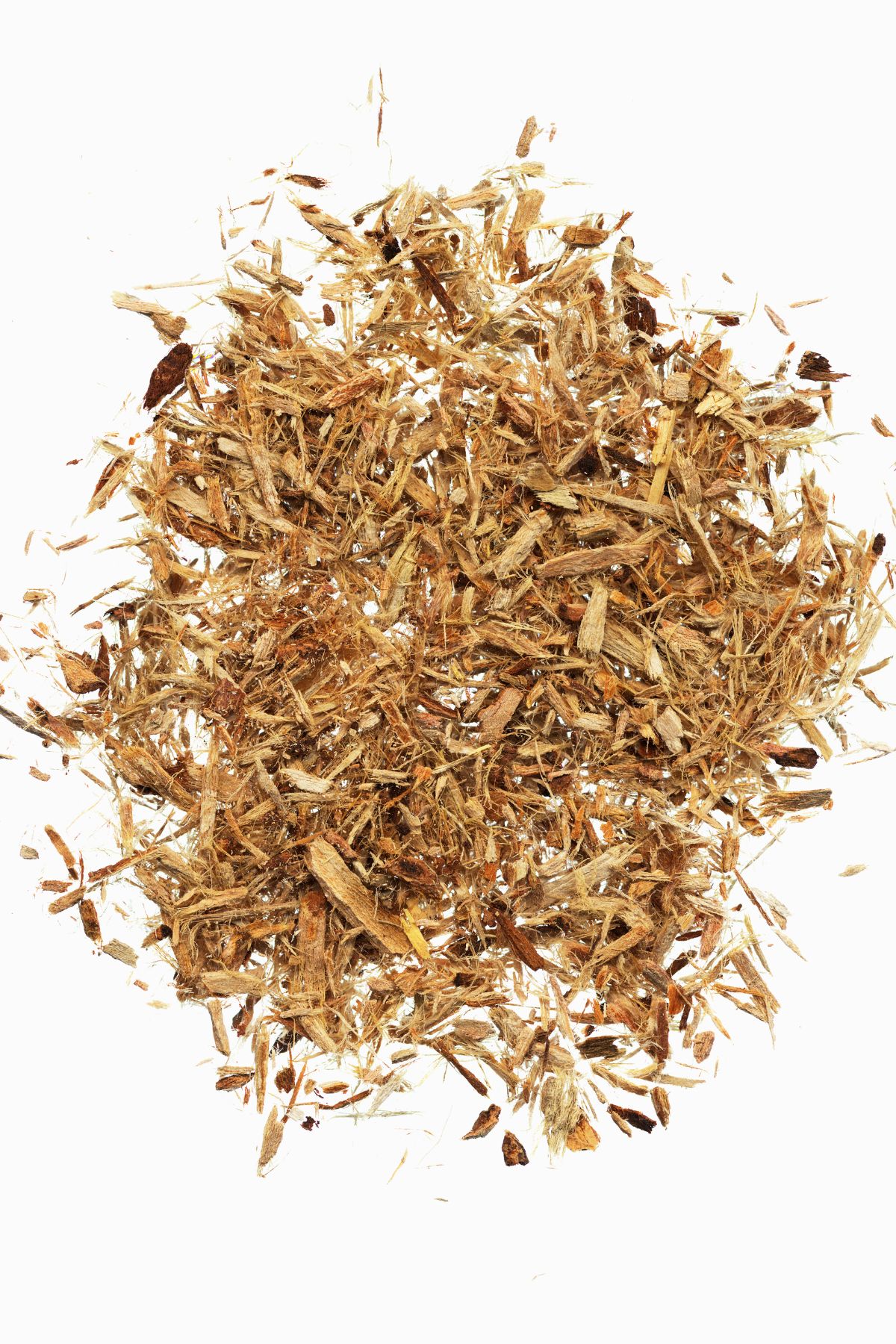
Slippery elm comes from the inner bark of the tree and – just like marshmallow – it contains mucilage.
This means that it can soothe irritation and protect the digestive tract in just the same way, potentially helping reduce the symptoms of IBS and inflammatory bowel disease. It has also been shown to have an antioxidant effect on people suffering from Crohn’s disease.
Slippery elm is available dried in powdered form, which can be taken as capsules or used to make tea.
9. Licorice root
You may be familiar with licorice as a flavoring in candy, but it has a long history as a medicinal herb.
It has both anti-inflammatory and antioxidant properties, so it is useful in preventing gut inflammation, protecting intestinal cells, and reducing the symptoms of uncomfortable conditions like acid reflux.
These benefits come from a compound called glycyrrhizin, which gives the root its sweet taste. Studies have shown that glycyrrhizin can also help eradicate H. pylori, a harmful gut bacteria that can cause stomach ulcers.
Licorice root is available in a variety of forms, including teas, capsules, and tinctures.
But you should speak to your doctor before taking it, as it can interact with certain medications and is particularly unsafe for people with hypertension (high blood pressure) or heart or kidney disease.
10. Dandelion

Last but not least is the humble dandelion plant, which is packed with antioxidants.
The root is a great source of inulin – a soluble fiber that can help maintain the healthy balance of bacteria in your gut – while studies on rats showed that dandelion can increase the rate at which the stomach empties. This can be useful in preventing nausea and indigestion.
Dandelion contains polyphenols that can help reduce intestinal inflammation and it’s also rich in fiber, meaning it’s helpful in keeping the bowel regular and avoiding problems like diverticulitis.
You can consume dandelion greens cooked or raw, or make them into a tea.
Gut Health Basics
The term “gut” refers to your entire digestive system, starting from your mouth, ending at your anus, and including the pharynx (throat), esophagus, stomach, small intestine, large intestine, and rectum.
Healthy microbiome
Your gut is home to trillions of bacteria – collectively known as the microbiome. Most of these are good – and important to your overall health and well-being – but some are “pathogenic”, potentially causing disease.
When your gut is in good shape, the friendly bacteria coexist with the potentially harmful bacteria.
This harmonious balance helps your digestive system function effectively. It influences your health in other ways, too, potentially protecting against conditions like type 2 diabetes and cancer, and even supporting the immune system.
A healthy gut means that you have healthy digestion most of the time without a lot of upset stomach or digestive issues.
Gut imbalances
But sometimes the balance between good and bad bacteria is disturbed, resulting in a variety of health problems.
Some of the factors that can lead to an imbalance of bacteria in the gut include:
- A poor diet, high in sugary and/or processed foods
- Stress
- Poor sleep quality
- Taking antibiotics
Symptoms of gut and digestive problems
When your gut health is compromised, you may experience stomach disturbances like gas, diarrhea, bloating, constipation, and heartburn.
You may also stop absorbing nutrients effectively from the foods you eat, or your blood sugar levels may be affected, causing unexpected changes to your weight.
Other signs of an unhealthy gut or poor gastrointestinal health include:
- Skin irritation or ongoing rashes or hives,
- Disturbed sleep or insomnia,
- Food intolerances or allergies,
- Autoimmune conditions like celiac disease and lupus
Natural gut healing
While some of the causes of reduced gut health may be out of your control, there are things you can do to reverse the problem.
Eating a clean diet containing lots of fiber-rich fruits and vegetables is important, and foods or supplements containing probiotics (good bacteria) can be very useful too.
There are also lots of herbs that help support gut health, with modern medicine now confirming the benefits of these traditional remedies.
Gut Healing Herb FAQs
Herbs added to foods and consumed in smaller quantities are generally considered safe during pregnancy or when breastfeeding. But you should speak to your healthcare provider before taking supplements, as some may be harmful, or there simply isn’t enough evidence to be confident that they are safe. Furthermore, you can’t be sure of their quality, as some herbal supplements are not regulated.
In some respects, the “best” format for taking herbs depends on personal preference and convenience. Capsules and tinctures can be great if you have a busy lifestyle, as you get the benefits without investing the time you’d need to prepare tea. Similarly, a liquid supplement is ideal if you don’t like swallowing pills. If you don’t like the taste, then you can easily hide it by mixing it into a strong-tasting fruit juice like grapefruit juice.
When it comes to potency, however, you’re generally better off taking a herb in capsule or tincture form – teas are simply not as strong. Tinctures are actually the better choice, as they contain alcohol that allows them to be absorbed directly into your bloodstream rather than traveling through the digestive tract. If you choose to take capsules, be sure to check their ingredients – some may contain allergenic fillers or additives.
Don’t Miss These Gut Health Resources
Conclusions
Poor gut health can contribute to a variety of problems throughout the body – some uncomfortable and some potentially serious. Enjoying these herbs as part of a healthy diet – or taking them in supplement form after consulting your doctor – can be an effective and natural way of supporting your digestive system so it can function effectively.
Don’t forget to join my newsletter list to get exclusive clean eating recipes and tips. The newsletter is 100% free with no spam; unsubscribe anytime.
About the Author: Carrie Forrest has a master’s degree in public health with a specialty in nutrition and is a certified holistic nutritionist. She is a top wellness and food blogger with over 5 million annual visitors to her site. Carrie has an incredible story of recovery from chronic illness and is passionate about helping other women transform their health. Send her a message through her contact form.
Note: this post is for informational purposes only and is not intended as medical advice. Please consult your healthcare provider for recommendations related to your individual situation.




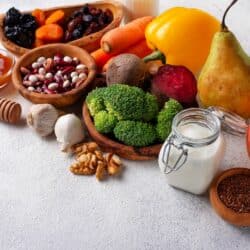
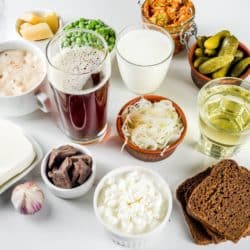





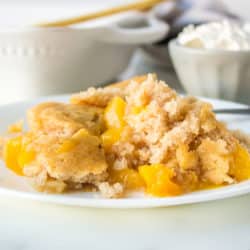






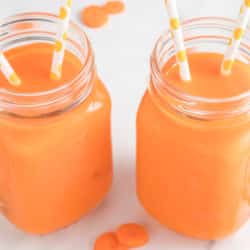


Carrie,
Thank you for sharing your wealth of knowledge. I appreciate how easy it is to look something up and that you explain in laymen’s terms. I am excited to see your recipe book as well
😀